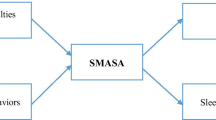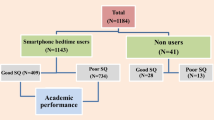Abstract
Social jetlag is a recent problem that is associated with a wide range of issues in the context of modern life. However, differences in the effects of social jetlag on sleep quality between young and middle-aged workers remain unclear. Accordingly, we aimed to examine the different effects of social jetlag on sleep quality in young (20–39 years) and middle-aged (40–59 years) workers from one factory. We included 106 male full-time workers (average age: 35.8 ± 11.5 years) who worked at the Kobe Factory of Fuji Electric Co., Ltd. Social jetlag was evaluated using the Munich ChronoType Questionnaire Japanese Version. Subjective sleep quality was assessed using the Pittsburgh Sleep Quality Index Japanese Version. Chronotype was determined using the Morningness–Eveningness Questionnaire Japanese Version (MEQ), while the health-related quality-of-life was evaluated using a revised version of the MOS 36-Item Short-Form Survey. Furthermore, we examined factors related to sleep quality in each age group using multiple regression analysis. Subjective sleep quality in the analysis set was poor; moreover, 39.4% of the participants had social jetlag for ≥ 1 h. Compared with middle-aged workers, young workers showed significantly longer and lower social jetlag and MEQ scores, respectively. Multiple regression analysis revealed that mental health and social jet lag were significantly associated with sleep quality in young participants. Contrastingly, social jetlag was not associated with sleep quality in middle-aged workers. Our findings demonstrate the importance of considering the effects of age-based factors on sleep quality.
Similar content being viewed by others
References
Schroeder AM, Colwell CS. How to fix a broken clock. Trends Pharmacol Sci. 2013;34(11):605–19. https://doi.org/10.1016/j.tips.2013.09.002.
Wittmann M, Dinich J, Merrow M, Roenneberg T. Social jetlag: misalignment of biological and social time. Chronobiol Int. 2006;23(1–2):497–509. https://doi.org/10.1080/07420520500545979.
Okajima I, Komada Y, Ito W, Inoue Y. Sleep dept and social jetlag associated with sleepiness, mood, and work performance among workers in Japan. Int J Environ Res Public Health. 2021;18(6):2908. https://doi.org/10.3390/ijerph18062908.
Higgins S, Stoner L, Black K, et al. Social jetlag is associated with obesity-related outcomes in 9–11-year-old children, independent of other sleep characteristics. Sleep Med. 2021;84:294–302. https://doi.org/10.1016/j.sleep.2021.06.014.
Mota MC, Silva CM, Balieiro LCT, et al. Social jetlag and metabolic control in non-communicable chronic diseases: a study addressing different obesity statuses. Sci Rep. 2017;7(1):6358. https://doi.org/10.1038/s41598-017-06723-w.
Chaput JP, Dutil C, Featherstone R, et al. Sleep timing, sleep consistency, and health in adults: a systematic review. Appl Physiol Nutr Metab. 2020. https://doi.org/10.1139/apnm-2020-0032.
Islam Z, Hu H, Akter S, et al. Social jetlag is associated with an increased likelihood of having depressive symptoms among the Japanese working population: the Furukawa nutrition and health study. Sleep Research Society. 2020;43(1):1–7. https://doi.org/10.1093/sleep/zsz204.
Fischer D, Lombardi DA, Marucci-Wellman H, Roenneberg T. Chronotypes in the US–Influence of age and sex. PLoS ONE. 2017;12(6): e0178782. https://doi.org/10.1371/journal.pone.0178782.
Komada Y, Okajima I, Kitamura S, Inoue Y. A survey on social jetlag in Japan: a nationwide, cross-sectional internet survey. Sleep Biol Rhythms. 2019;17:417–22. https://doi.org/10.1007/s41105-019-00229-w.
Kitamura S, Hida A, Aritake S, et al. Validity of the Japanese version of the Munich chronotype questionnaire. Chronobiol Int. 2014;31(7):845–50. https://doi.org/10.3109/07420528.2014.914035.
Roenneberg T, Kuehnle T, Juda M, et al. Epidemiology of the human circadian clock. Sleep Med Rev. 2007;11(6):429–38. https://doi.org/10.1016/j.smrv.2007.07.005.
Buysse DJ, Reynolds CF 3rd, Monk TH, et al. The Pittsburgh sleep quality index: a new instrument for psychiatric practice and research. Psychiatry Res. 1989;28(2):193–213. https://doi.org/10.1016/0165-1781(89)90047-4.
Doi Y, Minowa M, Uchiyama M, et al. Psychometric assessment of subjective sleep quality using the Japanese version of the Pittsburgh sleep quality index (PSQI-J) in psychiatric disordered and control subjects. Psychiatry Res. 2000;97:165–72. https://doi.org/10.1016/s0165-1781(00)00232-8.
Horne JA, Ostberg O. A self-assessment questionnaire to determine morningness-eveningness in human circadian rhythms. Chronobiol Int. 1976;4:97–110.
Ware JE Jr, Sherbourne CD. The MOS 36-item short-form health survey (SF-36). I. Conceptual framework and item selection. Med Care. 1992;30(6):473–83.
Fukuhara S, Bito S, Green J, et al. Translation, adaptation, and validation of the SF-36 health survey for use in Japan. J Clin Epidemiol. 1998;51(11):1037–44. https://doi.org/10.1016/s0895-4356(98)00095-x.
Fukuhara S, Ware JE, Kosinski M, et al. Psychometric and clinical tests of validity of the Japanese SF-36 health survey. J Clin Epidemiol. 1998;51(11):1045–53. https://doi.org/10.1016/s0895-4356(98)00096-1.
Suzukamo Y, Fukuhara S, Green J, et al. Validation testing of a three-component model of short form-36 scores. J Clin Epidemiol. 2011;64(3):301–8. https://doi.org/10.1016/j.jclinepi.2010.04.017.
Ware JE Jr. Standards for validating health measures: definition and content. J Chronic Dis. 1987;40(6):473–80. https://doi.org/10.1016/0021-9681(87)90003-8.
Stewart AL, Hays RD, Ware JE Jr. The MOS short-form general health survey. Reliability and validity in a patient population. Med Care. 1998;26(7):724–35. https://doi.org/10.1097/00005650-198807000-00007.
Laskemoen JF, Simonsen C, Büchmann C, et al. Sleep disturbances in schizophrenia spectrum and bipolar disorders - a transdiagnostic perspective. Compr Psychiatry. 2019;91:6–12. https://doi.org/10.1016/j.comppsych.2019.02.006.
Aschbrenner KA, Naslund JA, Salwen-Deremer JK, et al. Sleep quality and its relationship to mental health, physical health and health behaviours among young adults with serious mental illness enrolled in a lifestyle intervention trial. Early Interv Psychiatry. 2020;16(1):106–10. https://doi.org/10.1111/eip.13129.
Burgess HJ, Eastman CI. Early versus late bedtimes phase shift the human dim light melatonin rhythm despite a fixed morning lights on time. Neurosci Lett. 2004;356(2):115–8. https://doi.org/10.1016/j.neulet.2003.11.032.
Taylor A, Wright HR, Lack LC. Sleeping-in on the weekend delays circadian phase and increases sleepiness the following week. Sleep Biol Rhythms. 2008;6:172–9. https://doi.org/10.1111/j.1479-8425.2008.00356.x.
Acknowledgements
We thank all volunteers for participating in this study.
Funding
The authors received no financial support for the research, authorship, and/or publication of this article.
Author information
Authors and Affiliations
Corresponding author
Ethics declarations
Conflict of interest
The authors report no conflicts of interest.
Ethical approval
This study was approved by the Ethics Committee of Kobe University (approved numbers: 2019-833). All participants were informed about the nature of this study and provided written informed consent.
Additional information
Publisher's Note
Springer Nature remains neutral with regard to jurisdictional claims in published maps and institutional affiliations.
Rights and permissions
Springer Nature or its licensor holds exclusive rights to this article under a publishing agreement with the author(s) or other rightsholder(s); author self-archiving of the accepted manuscript version of this article is solely governed by the terms of such publishing agreement and applicable law.
About this article
Cite this article
Tan, C., Sato, K. & Shiotani, H. The relationship between social jetlag and subjective sleep quality: differences in young and middle-aged workers. Sleep Biol. Rhythms 21, 7–12 (2023). https://doi.org/10.1007/s41105-022-00410-8
Received:
Accepted:
Published:
Issue Date:
DOI: https://doi.org/10.1007/s41105-022-00410-8




